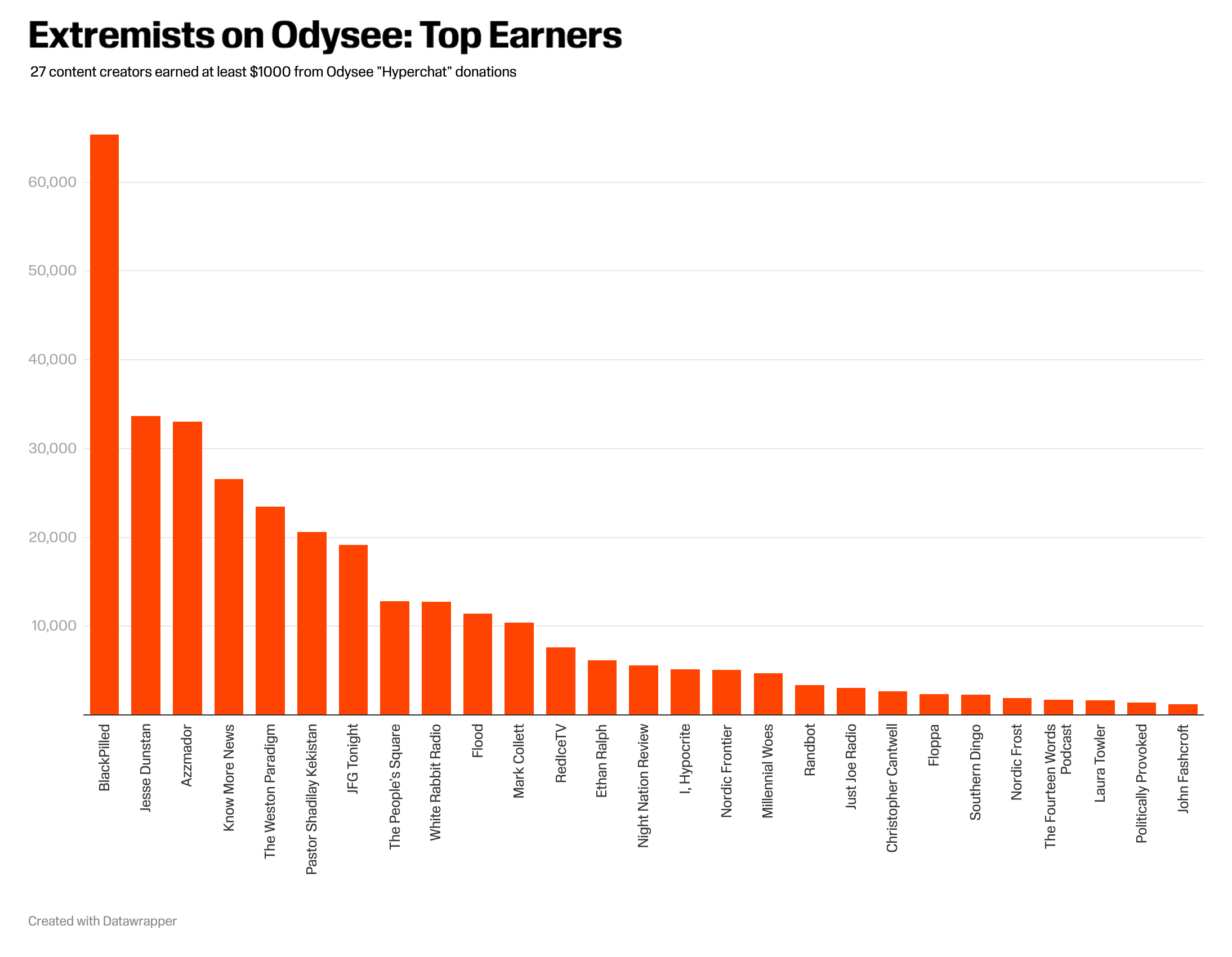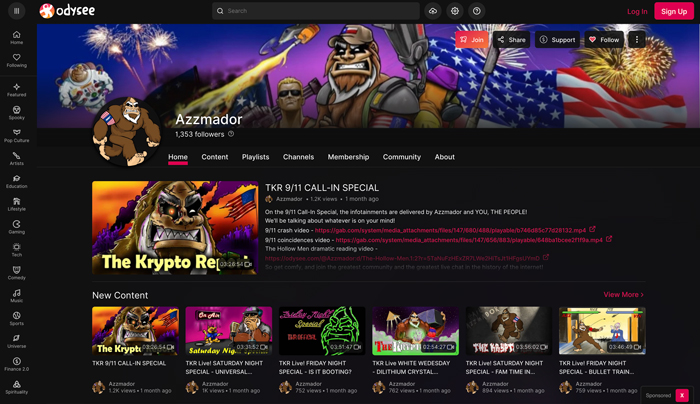Digital Threat Report: Odysee
Executive summary
Odysee is a video-storage and livestreaming platform designed as an alternative to YouTube. SPLC’s Data Lab found that Odysee has little to no content moderation and provides a steady income stream for hate groups and extremists, including fugitives, some of whom are earning thousands of dollars each month peddling hateful or violent content on the site.
What is Odysee?
Odysee is a decentralized video hosting platform that initially launched in September 2020. The platform was created as a subsidiary of LBRY, a file-sharing platform founded in 2015 by a group of cryptocurrency enthusiasts including Jeremy Kauffman. They created LBRY to combine file sharing and cryptocurrency in a “free speech” business model that would use blockchain technology to create a supposedly censor-proof platform for such content as videos and documents.
Kauffman, who has described himself as a “dissident” and ran in 2022 as the Libertarian candidate for U.S. Senate in New Hampshire, created Odysee in 2020 as a user-friendly, YouTube-like interface to the underlying LBRY blockchain. The platform was intended to help bring back an internet where “anyone could speak and anyone could have a voice,” he said.
Odysee: A digital threat
Online platforms and digital technologies such as Odysee become dangerous when they serve as a dumping ground for extremist and hateful content, or when they actively enable extremist and hateful behavior by providing moneymaking opportunities or valuable technical features.
Due to its lax stance on content moderation, Odysee has become a haven for individuals to store and create video content that would not be allowed on more mainstream platforms. For instance, Robert Warren “Azzmador” Ray, a fugitive wanted for his role in the violence at the deadly 2017 “Unite the Right” rally in Charlottesville, Virginia, has a very active channel on Odysee. Ray has been banned from most other mainstream platforms including YouTube, X (formerly known as Twitter) and the gaming-oriented video streaming platform DLive. The Nordic Resistance Movement, a neo-Nazi organization with a presence in Sweden and other Nordic countries that some lawmakers have argued should be labeled a terrorist organization by the United States, maintains several Odysee channels, including at least one English-language channel designed for distributing propaganda. The Right Stuff podcast network and its affiliated National Justice Party, both white nationalist groups, maintain channels on Odysee after being banned from YouTube, X, and Facebook.
Odysee’s own executives have repeatedly defended their practice of allowing videos on the site that promote white supremacist material, conspiracy theories and misinformation. When asked about videos on Odysee that promote the Proud Boys, a militant far-right group whose leaders were convicted of seditious conspiracy for their role in the Jan. 6, 2021, attack on the Capitol, CEO Kauffman stated that groups like the Proud Boys “should be allowed to speak to others that want to hear them.”
Odysee has also introduced technical features and monetization options that Kauffman says set the platform apart from YouTube and other video-hosting sites, and that have added to Odysee’s appeal to extremists. The first is the inclusion of blockchain technology, which is the basis for the LBRY protocol that Odysee was built on. Kauffman promoted the LBRY protocol as “the most censorship-resistant system to ever exist for the purposes of publishing digital content.”
Odysee is also unique in the way it allows monetization of content through the use of a cryptocurrency called LBRY Credits (LBC). Content creators can receive payments in LBC based on such engagement metrics as the number of views their content has received.
Importantly, Odysee also includes more traditional monetization options for content creators, such as the ability to charge subscription fees, similar to such platforms as Patreon or Buy Me A Coffee, and to accept donations in the form of “tips,” like YouTube Superchats or StreamLabs Tipping.
These monetization options, coupled with the founders’ positioning of the platform as “censorship-resistant,” have made Odysee popular with content creators who have been removed from other sites for violating rules against hate speech and other harmful behavior.
How Odysee enables extremists to earn money
To understand more about how Odysee enables fundraising, the Data Lab collected publicly posted information from 165 extremist channels using the platform to host 50,459 videos between April 24, 2021, and Aug. 31 of this year.
The Data Lab found that 113 of these channels had at least one video that earned at least one Hyperchat donation. Hyperchats are “tip”-style donations that are displayed next to a chat comment posted by the donor. Hyperchats can be paid in regular fiat currency including dollars and Euros or in LBC, the site cryptocurrency.
Using the data collected from each Odysee channel, the Data Lab calculated that this group of 113 channels solicited 40,316 Hyperchat donations from 4,557 different Odysee users, earning a total of $336,000.
Forty percent of this total, around $132,000, was donated to just three channels: Devon Stack’s “Blackpilled” channel, Jesse Dunstan’s “Uncle Sven’s Other Tone Stream” channel and Robert Warren “Azzmador” Ray’s channel.
The top earning channel in our sample, Blackpilled, received $65,362 in Hyperchat donations. The operator of this channel is Devon Stack, author of Day of the Rope, a neo-fascist novel depicting a future America embroiled in a race war. The title of Stack’s self-published novel refers to a similar fantastical day of retribution against race traitors depicted in William Luther Pierce’s The Turner Diaries. Stack also still maintains a channel on YouTube, where he has nearly 200,000 followers. On that site, Stack suggests several ways to send him money outside of YouTube because “they demonetize most my videos” [sic].
Uncle Sven’s Other Tone Stream, an Odysee channel run by Jesse Dunstan, who goes by “Sven” online, earned $33,676 from Hyperchats. Of this amount, $22,300 came from a single donor who uses the username “whwhwh” on the site. Dunstan is one of the principals of The Right Stuff, a white nationalist podcast network that features antisemitic and racist shows such as “The Daily Shoah” and “The People’s Square.”
Dunstan and The Right Stuff are also closely affiliated with the National Justice Party, a white nationalist membership organization that periodically hosts outlandish street demonstrations designed to garner media attention. One of these street demonstrations, held in Waukesha, Wisconsin, in the wake of a 2021 car attack on a Christmas parade, inspired the highest-earning video in our study, called “The People’s Square / Strike and Mike - NJP and Media2Rise Waukesha Documentary Fundraiser.” This livestreamed video fundraiser garnered $6637.01 across 109 donations from 89 different individuals.
The channel run by Robert Warren “Azzmador” Ray has earned $33,023 in Hyperchats on Odysee since 2021. Ray is a fugitive wanted since 2018 on a felony charge of illegally using pepper spray against Unite the Right counterprotesters. Ray also has bench warrants issued for his arrest stemming from his refusal to appear in subsequent civil cases that were filed against him and the other organizers of the deadly 2017 rally.
To take donations on Odysee, the platform requires prospective earners to link a bank account using Stripe, a separate company that processes digital payments. The website explains, “By adding a bank account, you’ll be able to receive cash tips from other users” and “every 2-3 business days, the tips sent to your Odysee wallet will automatically cash out and be sent to your bank account.”
Odysee’s payment chart indicates that 5% of Ray’s earnings, or around $1,651, will have been collected by Odysee as platform fee, with Stripe collecting at least 2.9%, or around $957, as a processing fee. Stripe also claims 30 cents per transaction for payments.
For a May article about Ray’s use of Odysee, SPLC’s Hatewatch and Data Lab emailed Odysee and Stripe for comment. Odysee did not reply. A spokesperson for Stripe replied, citing the company’s “policy against commenting about any user or sharing the details about any review,” and offering links to Stripe’s service agreement and prohibitions the company enforces on users.
Odysee’s terms of service state users may not “use the Services for any illegal or unauthorized purpose or engage in, encourage, or promote any illegal activity.”
Odysee did not reply to another request for comment for this report, so it remains unclear why Ray could earn money on the site while a wanted fugitive.
Regulatory and financial woes
In March 2021, the Securities and Exchange Commission (SEC) sued Odysee’s parent company LBRY for issuing unregistered securities in the form of the company’s LBC tokens.
A federal court ruled in favor of the SEC in November 2022, initially ruling that LBRY was responsible for paying back $22 million to the buyers of those securities, as well as a $22 million fine to the SEC. In May, the SEC petitioned the court to reduce LBRY’s fine to $111,614 since LBRY was “defunct, ceasing operations, and without the funds to pay a larger fine.”
On Sep. 13, the Odysee X (formerly Twitter) account posted and then deleted a message announcing that the company’s “future [was] in jeopardy” but that it had received “financial and other aid” from Arweave, another company offering a decentralized, blockchain-based file storage system.
On Oct. 6, LBRY’s main creditor, Space Odysee Inc., sued LBRY in Delaware’s Civil Chancery Court, requesting that a receiver be appointed to ensure that Odysee, which was pledged as collateral in the loans, could retain some financial value. On Oct. 20, LBRY posted a letter to its Odysee channel stating that its “assets, including Odysee, are being placed into receivership. As of this post, all LBRY executives, employees, and board members have resigned.” The post went on to speculate about whether Odysee would continue to use the LBRY blockchain to store its content or whether it would be redesigned.
Given these financial and technical challenges, the future of Odysee is unclear.




